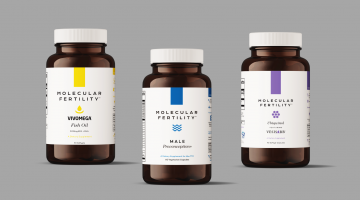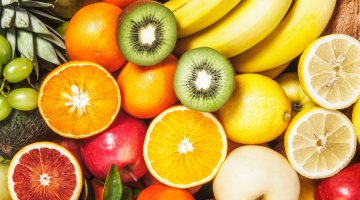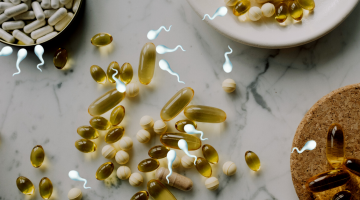10 Foods That Increase Sperm Count and Motility Fast

If you’re looking for ways to boost sperm count and motility through diet, you’re in the right place.
The good news is that men continuously produce new sperm, which means there’s always an opportunity to improve sperm health. By focusing on nutrient-rich foods that support sperm production and steering clear of those that harm it, you can make a real difference in fertility outcomes.
Because sperm quality is essential, no matter how you’re trying to conceive, this article will highlight 10 of the best foods for improving sperm count and motility, along with fertility supplements like Male Preconception+, which we recommend as aded nutritional support for sperm health.
1. Beef: Zinc, Selenium, Vitamin B 12, and Carnitine
Beef is one of the most nutrient-rich foods out there, so it’s no surprise that it can help support healthy sperm count and motility. It’s packed with key nutrients, including zinc, selenium, vitamin B12, and carnitine, that play crucial roles in sperm development, motility, and overall reproductive health.
| 1 lb Ribeye Steak | Amount | %Daily Value |
| Zinc | 22.4 mg | 72% |
| Selenium | 133.3 mcg | 192% |
| Vitamin B12 | 6.4 mcg | 56% |
| Carnitine | 432 mg | – |
The benefits of zinc for sperm quality are well documented, and zinc is one of the nutrients found at its highest concentration in beef.
Zinc is found at a higher concentration in human seminal plasma compared to any other human tissue. And it has been shown to improve critical aspects of male fertility, including sperm count, motility, and morphology.
A large review of studies on zinc and male fertility found that increasing zinc intake can improve sperm health by raising semen volume, helping sperm move better (motility), and increasing the number of normally shaped sperm (morphology).
Think of zinc as both the construction crew and the quality inspector for sperm. It provides the raw materials needed to build healthy sperm cells while also protecting them from damage so they can swim efficiently and reach the egg.
Numerous other studies have yielded similar findings, demonstrating that zinc can enhance many aspects of male fertility.
Acetyl L-Carnitine (ALC), often referred to simply as carnitine, plays a key role in sperm maturation. Research shows that carnitine is particularly effective at improving sperm motility (their ability to swim), while also supporting healthier sperm morphology (shape).
If you are looking for a place to start when it comes to boosting sperm count and motility through food, the most accessible and nutrient-packed option is a juicy steak.
2. Liver: Vitamin A, Vitamin B12, Folate
Liver is one of the most nutrient-dense foods on earth and a key source of fertility-supporting vitamins. It provides high off-the-charts levels of vitamin A, an abundance of vitamin B12 and folate, along with vitalizing compounds like CoQ10, all of which contribute to healthy sperm production and function.
| 3.5 oz Liver | Amount | %DV |
| Vitamin A | 14196 IU | 285% |
| Vitamin B12 | 49.8 mcg | 831% |
| Folate | 243.6 mcg | 60% |
| Co Q10 | 4.5 mg | – |
Research has shown that vitamin A is essential for male reproduction. Vitamin A is required for the maintenance of the male genital tract and spermatogenesis (the development of sperm.)
Co-Q10 can help to improve several semen parameters, including sperm concentration, count, and motility.
That said, 4.5 mg of CoQ10 is much less than the recommended dosage needed to significantly improve sperm count. To get the greatest CoQ10 for fertility benefits, you may want to consider a male fertility supplement.
Even so, the rich content of B vitamins, including B12 and folate, along with high-quality protein, makes liver one of the most powerful foods for better sperm count and overall sperm health.
3. Salmon & Sardines: Omega-3 and Vitamin B12
Salmon and sardines are rich in omega-3 fatty acids, which are known to offer a range of health benefits, including lowering blood pressure, reducing the development of plaque in arteries, and even reducing depression!
| Food | Amount of Omega 3s | %DV | Amount of Vitamin B12 | %DV |
| Salmon (1/2 filet 198g) | 3996 mg | – | 6.3 mcg | 105% |
| Sardines (1 cup) | 2205 mg | – | 13.3 mcg | 222% |
Omega-3s are one of the best 10 vitamins and supplements to increase sperm count. They play a vital role in the structure and formation of sperm cells and all other cells.
Studies consistently show that omega-3 fatty acids, are associated with better sperm count, motility, and morphology.
In head-to-head comparisons, omega-3s often outperform other antioxidants, especially in boosting sperm concentration.
Salmon and sardines also contain substantial amounts of vitamin B12, arginine, and aspartic acid, which have been shown to increase sperm count and motility.
All this places fatty fish like Salmon and Sardines among the top foods that boost sperm count fast!
4. Oysters: Zinc, Vitamin B12, Vitamin D, and Selenium
Long associated with enhancing passion and performance, it’s no surprise that from a nutritional perspective, oysters are also one of the most powerful fertility foods.
Their richness in trace minerals makes them especially beneficial for reproductive health, as these nutrients help regulate the endocrine system and support the production of hormones that influence both libido and sperm count.
While beef earns the top spot overall for boosting sperm count, thanks in part to its zinc content, oysters are unmatched when it comes to zinc alone.
They provide more zinc than any other food on this list and are also rich in vitamin B12, vitamin D, and selenium. This powerful nutrient combination makes oysters one of the most effective foods for improving sperm count and motility.
| Oysters (6 medium) | Amount | %DV |
| Zinc | 76.3 mg | 509% |
| Vitamin B 12 | 16.3 mcg | 272% |
| Selenium | 53.5 mcg | 76% |
| Vitamin D | 269 IU | 67% |
Research has shown that vitamin B12 can improve sperm count, motility, and overall quality
Because vitamin B12 is essential for sperm development—particularly DNA synthesis—it also supports the DNA integrity of sperm.
You can think of B12 as maintaining the sperm blueprint, ensuring that sperm are built with strong and accurate genetic instructions. Another study found that vitamin B12 not only enhances motility but can also improve sperm vitality.
Vitamin D and fertility are closely linked. The vitamin D receptor (VDR) and vitamin D metabolizing enzymes are found in male reproductive tissues. Low vitamin D status has been associated with low semen quality. This is likely due to the influence that vitamin D has on the testis. Vitamin D directly affects hormone production and the development of sperm.
Higher vitamin D levels have been associated with increased sperm motility and improved overall semen quality.
In addition to vitamins B12 and D, oysters also contain a high concentration of selenium, which has been shown to improve several aspects of male fertility. More on this sperm boosting super-nutrient below!
5. Brazil Nuts: Selenium
You may not often hear about Brazil nuts, but they are one of the richest natural sources of selenium, making them a powerful food for supporting male fertility.
Selenium is fundamental to human health and is involved in many bodily processes, including proper immune system function, the production of active thyroid hormone, and sperm motility.
If Brazil nuts are hard to come by, selenium can also be found at high concentrations in oysters, mussels, tuna, and cuts of of beef, pork, and chicken wings.
Food | Amount | RDA |
Brazil Nuts (1 nut) | 68-91 mcg | 123%-165% |
Pacific Oyster | 154 mcg | 280% |
Tuna (3 oz) | 92 mcg | 167% |
Mussel | 90 mcg | 165% |
Bottom Round Beef Steak | 33 mcg | 60% |
Pork (3 oz) | 33 mcg | 60% |
In one study, researchers measured the effects of selenium on sperm health. After selenium supplementation, 52.6% of participants experienced an increase in sperm motility and morphology. Over 10% of participants in the study achieved spontaneous pregnancy with their partners.
Several other studies have yielded similar results, supporting the use of selenium in improving sperm parameters.
Studies show that consuming more vitamin C can increase blood antioxidant levels up to 30% which reduces cellular damage.
In one study, men who received 2,000mg of vitamin C per day for 2 months showed substantial increases in their sperm count and motility.

As the graph above shows, vitamin C supplementation resulted in a more than twofold increase in sperm counts among the men studied.

In addition to the sperm count improvements, the percentage of motile sperm also nearly doubled from 31.2% motility to 60.1%. For reference, a motility of 50% is considered normal.
While fruits like guava, kiwi, and oranges are excellent sources of vitamin C, it can be difficult to reach optimal vitamin C levels through food alone without also consuming large amounts of sugar.
Excess sugar is not only harmful to overall health but has been associated with lower sperm motility and impaired semen quality.
For this reason, many men benefit from adding a carefully formulated vitamin C or male fertility supplement to help ensure consistent, therapeutic levels. male fertility supplements.
7. Tomatoes: Lycopene, Vitamin C
In addition to being a good source of vitamin C, tomatoes also contain a substantial amount of the plant nutrient lycopene.
Lycopene is what gives many different fruits their red color. It is known to be a powerful antioxidant with several positive effects on male fertility.
| Tomato (1 medium) | Amount | %DV |
| Lycopene | 4 mg | – |
| Vitamin C | 22.9 mg | 38% |
In one study, researchers found that consuming 4 mg of lycopene daily (the amount found in a medium-sized tomato) improved men’s sperm counts by an average of 22 million/ml, their motility by 25%, and their morphology by 10%. Other studies have confirmed these findings and shown support for lycopene improving male fertility.
8. Walnuts: Omega-3, Folate, B6, Zinc, Antioxidants
Walnuts provide a wide range of fertility-supportive nutrients, including several already mentioned in this article like zinc and Omega-3s.
Other nutrients in walnuts that we haven’t discussed include folate and B6, both of which play essential roles in male fertility and sperm quality.
| Walnuts (1 cup) | Amount | %DV |
| Omega 3 | 10,623 mg | – |
| Folate | 115 mcg | 29% |
| B6 | 0.6 mg | 31% |
| Zinc | 3.6 mg | 24% |
Folate is essential for male fertility and plays an important role in spermatogenesis (the formation of sperm inside the testicles). During sperm development, DNA undergoes multiple rounds of replication, and folate is required for accurate DNA synthesis. Adequate folate levels help ensure that sperm cells develop with stable and intact genetic material, which is vital for fertility.
When folate levels are low, sperm may replicate improperly, which reduces sperm quality.
Vitamin B6 is growing in popularity in the fertility field. Evidence suggests that B6 plays an important role in maintaining normal sperm parameters.
In one study, men with diminished sperm motility were found to have lower seminal plasma B6 when compared to men with normal sperm motility.
9. Garlic
Garlic contains significant amounts of several vitamins and nutrients mentioned in this article, but garlic as a whole has been found to have positive effects on male fertility.
| Garlic (1 cup) | Amount | %DV |
| Vitamin C | 42.4 mg | 71% |
| Vitamin B6 | 1.7 mg | 84% |
| Selenium | 19.3 mcg | 28% |
A comprehensive review of 18 in vivo studies concluded that garlic exhibits fertility-enhancing effects such as improved spermatogenesis, increased testosterone levels, and enhanced testicular structure.
The authors suggest these benefits are largely due to garlic’s antioxidant properties, which help protect and nourish the reproductive system. Although additional studies are required to confirm the efficacy of using garlic to improve other aspects of male fertility, evidence suggests that garlic may also protect against damage to sperm production and testosterone levels caused by chemotherapy treatments.
Next time you’re looking too cook a meal with foods that increase sperm count, throw in some extra garlic.
10. Amla Berry (Indian Gooseberries)
Similar to garlic, amla berries as a whole have been shown to positively impact sperm quality and male fertility.
In an animal study where amla fruit powder (AFP) was fed to rabbits, those rabbits showed significant improvements in
- Ejaculate volume and sperm concentration
- Total sperm output
- Motility and vitality
- Fertility rate
The researchers connected these improvements to amla’s antioxidant properties and hormonal support, particularly noting increased serum testosterone levels and enhanced semen antioxidant status.
In another study on rats toxic valproic acid was used on the animals to reduce testicular weight and sperm concentration. Pretreatment with Phyllanthus emblica (amla) extract improved sperm concentration, preserved testosterone, and restored testicular structure. These findings suggest amla offers protective effects on male reproductive health, even under conditions of chemical stress and toxin exposure.
Amla berries are known as super antioxidants. In a review of 119 different berries, amla berries were one of thirteen berries categorized as having the highest antioxidant capacity. a
A significant amount of research exists in support of antioxidants’ ability to improve male fertility, especially sperm quality.
Antioxidants shield our organs and cells, including those involved in spermatogenesis and other male fertility processes, from harmful reactive oxygen species.
Avoid These Foods to Increase Sperm Count or Motility
Processed Meats
Research shows that eating processed meats may reduce a man’s ability to fertilize an egg.
Researchers at Harvard T.H. Chan School of Public Health tracked the diets of 141 men. A link was established between frequent processed meat consumption and lower fertilization rates.
Men from the study who ate the least amount of processed meats had a 28% better chance of achieving pregnancy compared to to men who ate the most processed meats.
Other studies have affirmed these findings.
Fried Foods
When you’re trying to increase sperm count with food, you should steer clear of fried foods.Fried foods contain high levels of trans-fat, and trans-fat can be extremely harmful to male fertility.
Studies have shown that eating fried foods 1-2 times per week can decrease sperm counts by an average of 10.5% and sperm concentrations by 13.7%. Eating fried food 3 or more times per week can decrease sperm counts by an average of 24.5% and sperm concentrations by 17.2%.
Trans fats have also been inversely related to total sperm count, even in young men who are otherwise considered healthy.
Soy
Soy products contain xenoestrogens called phytoestrogens, which are known to harm sperm. Phytoestrogens can reduce sperm concentration.
Other studies support these findings, showing that a higher intake of soy is associated with lower sperm concentration. The results of these studies have been published and discussed in the Harvard Health Publishing
Alcohol
“Everything in moderation” is a useful guideline, especially when it comes to alcohol and fertility. Research shows that moderate alcohol intake does not significantly affect fertility. In contrast, numerous studies have found that heavy or chronic alcohol use is strongly associated with impaired fertility in men.
One study, in particular, focused on the difference in sperm quality between alcoholic and non-alcoholic men. Researchers concluded that decreased semen quality is linked to increased alcohol consumption.
A meta-analysis of 15 studies on alcohol and its effects on male fertility found that daily alcohol consumption had a consistently negative impact on sperm morphology and volume
The good news is that research has shown that men with a history of chronic alcohol intoxication can achieve a dramatic improvement in semen characteristics after three months of alcohol withdrawal.
Food Supplements to Support Sperm Count and Motility
Centering your diet around nutrient-dense, whole foods is the foundation of overall health, and sperm health in particular. But male fertility supplements can play an important role in filling any nutrient gaps and delivering bioavailable nutrients directly targeting sperm quality.
Though there are many supplement suppliers to choose from, CNY Fertility has created Molecular Fertility Male Preconception+ and Vivomega Fish Oil to support sperm count and motility with industry-leading purity and quality ingredients.
Foods That Increase Sperm Count and Motility: The Takeaway
The whole foods mentioned in this article are the foundation for increased sperm count, motility, and overall sperm health. Eating specific foods and avoiding others are easy ways to improve your natural fertility and increase the chances of getting pregnant.
That said, getting adequate fertility-supportive nutrients like CoQ10, PQQ, and Ashwagandha is impossible to get from diet alone. Many men benefit from adding a well-formulated male fertility supplement. This can help ensure consistent levels of the vitamins, minerals, and antioxidants shown in research to play an important role in sperm health and overall fertility.





